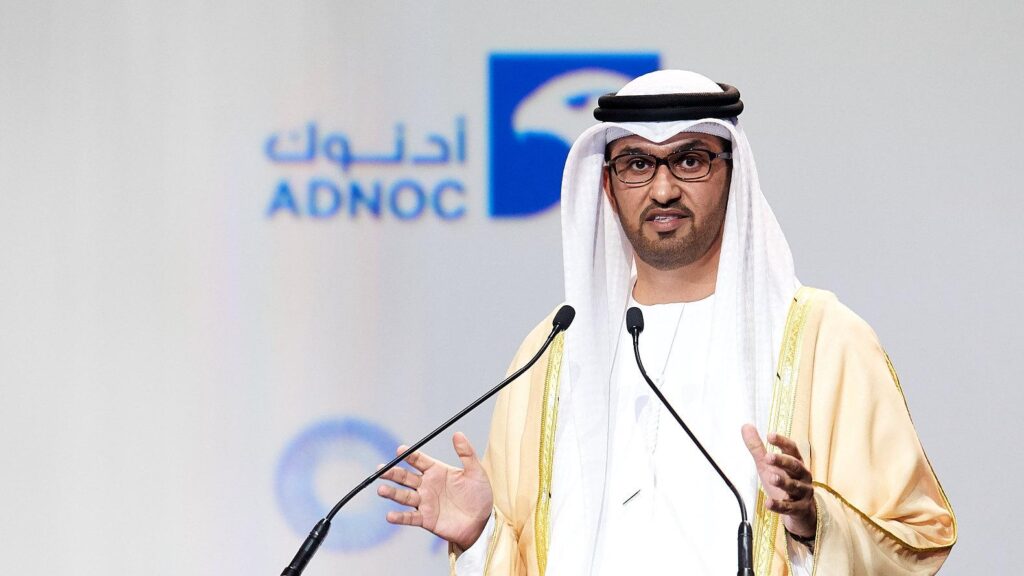The climate change COP process has been seriously compromised by the decision to hold the 2023 convention in the United Arab Emirates (UAE), a country whose record on fighting climate change is bad news for the climate. The nomination of Sultan Ahmed al-Jaber, chief executive of the Abu Dhabi National Oil Company (ADNOC), as the next president of COP28 is an added insult to those fighting climate change. Greta Thunberg called the move “completely ridiculous”.
In an article in the UK Guardian newspaper, Bill McGuire, professor emeritus of geophysical and climate hazards at UCL in the University of London, said: “It beggars belief that the UN thought it a good idea to allow an authoritarian petro-state to host such a critical meeting at the height of the climate emergency. Handing the presidency to Al Jaber has compromised the conference beyond repair, reinforcing concerns that the whole Cop process simply isn’t fit for purpose.”
“Fresh Approach”
The president of COP28, Sultan Ahmed al-Jaber of the United Arab Emirates (UAE), has promised a “fresh approach” to climate talks.
His plan for this new approach is, of course, nothing new at all. Zero movement on fossil fuel reductions, but calls for more finance from wealthy countries and reforms of the major lending institutions such as the World Bank and IMF, with more funding for climate action.
How are COP hosts decided?
How does such a terrible decision get made? The superficial reason lies in the rules of the COP rules set up under the United Nations Framework Convention on Climate Change. The venue for COP meeting rotates among five regions: Africa, Asia-Pacific, Eastern Europe, Latin America and Caribbean, and Western Europe and Others. The countries in the region propose the country. So when the Asia Pacific group nominated UAE, it was a done deal.
There can be little doubt that the UAE will use its influence at COP28 to head off any meaningful agreement on reducing the burning of fossil fuel. UAE is a major exporter of oil, and like most exporters of fossil fuels, would like to see exports continue for as long as possible.
Oil influence
The influence of the fossil fuel lobby on COP meetings goes back many years. The oil producing countries in OPEC have been attending every meeting, lobbying for “responsible” and “balanced” decisions.
Oil companies have also used the COP meetings to lobby against meaningful reductions in the burning of fossil fuels. According to the non profit science and medicine publisher, PLOS, the presence of fossil fuel intensive industries at the COP19 talks in Warsaw in 2013 was overwhelming.
Up till the 2019 COP25, oil companies were given an official role in the COP talks. The UN Framework Convention on Climate Change justified this travesty with the argument that everyone should be at the negotiating table.
But even after the companies lost their official role, and have been unable to sponsor events directly, they maintained a huge influence on the talks . The past two COPS have seen big increases in the involvement of fossil fuel lobbyists, with 600 of them attending COP27 in Egypt last year. Many of these lobbyists attend as part of official government delegations.
Political protection for fossil fuel
Fossil fuel interests are promoted by countries whose economies include large fossil fuel industries. Countries such as Saudi Arabia, other gulf states, Russia and India, all of them heavy users and/or exporters of fossil fuels, are notorious for their opposition to rapid carbon reduction timetables.
The US expressed its full support for UAE’s presidency of COP28. In the words of John Kerry, the US climate envoy, “ Dr Sultan al-Jaber is a terrific choice …the leadership of the UAE is committed to transitioning.”
In the countries with large greenhouse gas emissions, links between governments and fossil fuel companies are very close. In the US, about half of all senators and house of representative members receive sponsorship for the political campaigns from fossil fuel corporations.
Addicted to fossil fuel
The large international oil companies have huge influence over politicians from the companies where they operate. In India, which relies heavily on coal for its energy, the main coal company is government owned. And the petro-states, such as Saudi Arabia, UAE, and big coal exporters such as Indonesia and Australia, have economies that rely on income from their exports.
In short, the world and its leaders are addicted to fossil fuels. Fossil fuel companies are so powerful that political leaders shrink back from any possible confrontation.
Related to the close political links between politicians and fossil fuels is the central role energy plays in modern economies. Any rapid change to a country’s energy systems is likely to require major investment in new sources of electricity. In the short term, this will increase prices, making products less competitive and increasing the cost of living for its citizens.
In capitalist economies, there is no solution to the problem of higher energy costs without a significant redistribution of wealth, meaning large taxes on corporations and the very rich.
A better system
There can be no justification for the inclusion of fossil fuel companies, agribusiness and other powerful greenhouse gas lobbies. Decisions must be informed primarily by the need to reduce greenhouse gases as quickly as possible.
But the biggest stumbling block to real progress is the very concept of the “Conference of the Parties”, i.e. giving a voice (and potential veto) to every national state in the UN. Recognition of “national sovereignty” effectively gives the powerful big polluting countries the ability to prevent any decisions that would adversely affect their fossil fuel interests.
A much more streamlined body, in which technical experts would have real power, would be far more effective.
Given the make-up of international institutions at the moment, this seems like a far off dream – almost as far off as socialism spreading across the world. Activists must must inevitably continue to push for political accountability from leaders, rational long term decisions, and confronting all fossil fuel interests.


